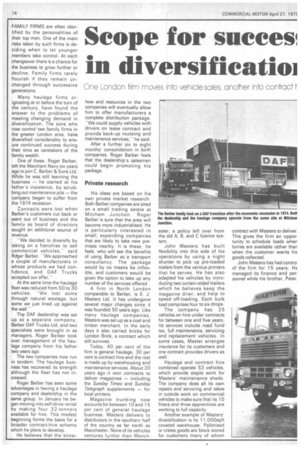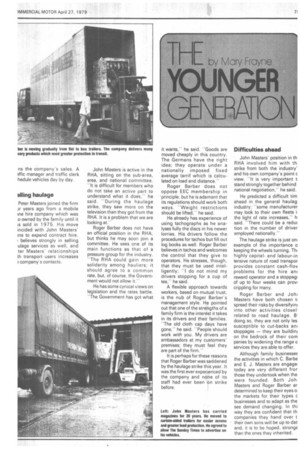Scope for succesi in diversificatim
Page 76

Page 77

If you've noticed an error in this article please click here to report it so we can fix it.
One London firm moves into vehicle sales, another into contract
--FAMILY FIRMS are often identified by the personalities of their top men. One of the main risks taken by such firms is deciding when to let younger members take control. At each changeover there is a chance for the business to grow further or decline. Family firms rarely flourish if they remain unchanged through successive generations.
Many haulage firms originating at or before the turn of the century, have found the answer to the problems of meeting changing demand in diversification. The sons who now control two family firms in the greater London area, have diversified considerably to ensure continued success during their time as caretakers of the family wealth.
One of these, Roger Barber, left the Merchant Navy six years ago to join C. Barber & Sons Ltd. While he was still learning the business — he started at his father's insistence, by scrubbing out maintenance pits — the company began to suffer from the 1 974 recession.
Contracts were lost when Barber's customers cut back or went out of business and the family as board of directors sought an additional source of revenue.
"We decided to diversify by taking on a franchise to sell commercial vehicles,said Rdger Barber. "We approached a couple of manufacturers in whose products we had confidence, and DAF Trucks accepted our offer."
At the same time the haulage fleet was reduced from 50 to 30 vehicles. "We lost some through natural wastage, but some we just lined up against the wall.
The DAF dealership was set up as a separate company, Barber DAF Trucks Ltd, and two specialists were brought in as managers. Roger Barber took over management of the haulage company from his father two years ago.
The two companies now run in tandem. The haulage business has recovered its strength although the fleet has not increased.
Roger Barber has seen some advantages in having a haulage company and dealership in the same group. In January he began moving into self-drive rental by making four 32-tonners available for hire. This modest beginning forms the basis for a broader contract-hire scheme which he plans to develop.
He believes that the know how and resources in the two companies will eventually allow him to offer manufacturers a complete distribution package. "We could supply vehicles with drivers on lease contract and provide back-up routeing and maintenance services," he said.
After a further six to eight months' consolidation in both companies, Roger Barber feels that the dealership's salesmen could begin promoting his package.
Private research
His ideas are based on his own private market research, Both Barber companies are sited on a small trading estate at Mitcham Junction. Roger Barber is sure that the area will become more industrialised. He is particularly interested in small, expanding companies that are likely to take new premises nearby, It is these, he feels, who will see the benefits of using Barber as a transport consultancy. The package would by no means be inflexible, and customers would be given the option to take up any number of the services offered.
A firm in North London comparable to Barber, is E. J. Masters Ltd. It has undergone several major changes since it was founded 50 years ago. Like many haulage companies, Masters was set up as a coal and timber merchant. In the early days it also carried bricks for London Brick, a contract which still survives.
Today, 40 per cent of the firm is general haulage, 30 per cent is contract hire and the rest is made up by warehousing and maintenance services. About 20 years ago it won contracts to deliver magazines — including the Sunday Times and Sunday Telegraph supplements — for local printers.
Magazine trunking now accounts for between 10 and 15 per cent of general haulage business. Masters delivers to distributors in the southern half of the country as far north as Manchester. None of its vehicles ventures further than Manch ester, a policy left over from the old A, B, and C licence system.
John Masters has built flexibility into this side of his operations by using a night shunter to pick up pre-loaded trailers from the various printers that he serves. He has also adapted his vehicles by introducing two curtain-sided trailers which he believes keep the magazine drier, and help to speed off-loading. Each bulk load comprises four to six drops.
The company has 25 vehicles on hire under contracts for between one and five years. Its services include road fund tax, full maintenance, servicing and replacement vehicles. In some cases, Master arranges insurance for its customers and one contract provides drivers as well.
Haulage and contract hire combined operate 53 vehicles, which provide staple work for Masters' maintenance sheds. The company does all its own repairs and servicing and takes in outside work on commercial vehicles to make sure that its 10 fitters and three apprentices are working to full capacity.
Another example of Masters' diversification is its 11,000sqft covered warehouse. Palletised or crates goods are block stored for customers many of whom
contract with Masters to deliver. This gives the firm an oppor. tunity to schedule loads when lorries are available rather thar when the customer wants hi goods collected.
John Masters has had contro of the firm for 15 years. HE managed its finance and personnel while his brother, Peter, ns the company's sales. A iffic manager and traffic clerk hedule vehicles day by day.
oiling haulage
Peter Masters joined the firm Ar years ago from a mobile line hire company which was o owned by the family until it is sold in 1975. His move incided with John Masters' ins to expand contract hire.
believes strongly in selling ulage services as well, and ter Masters' relationships th transport users increases ) company's contacts.
John Masters is active in the RHA, sitting on the sub-area, area, and national committee. "It is difficult for members who do not take an active part to understand what it does," he said. "During the haulage strike, they saw more on the television than they got from the RHA. It is a problem that we are looking at.
Roger Barber does not have an official position in the RHA, but thinks he may soon join a committee. He sees one of its main functions as that of a pressure group for the industry. "The RHA could gain more solidarity among hauliers; it should agree to a common rate, but, of course, the Government would not allow it," He has some cynical views on legislation and the rates battle. "The Government has got what it wants," he said. "Goods are moved cheaply in this country. The Germans have the right idea; they operate under a • nationally imposed fixed average tarrif which is calculated on load and distance."
Roger Barber does not oppose EEC membership in 'principle, but he is adamant that its regulations should work both ways. "Weight restrictions should be lifted," he said.
He already has experience of using tachographs as he analyses fully the discs in his newer lorries. His drivers follow the procedures for tachos but fill out log books as well. Roger Barber believes in tachos and welcomes the control that they give to operators. He stresses, .though, that they must be used intelligently; "I do not mind my drivers stopping for a cup of tea," he said.
A flexible approach towards workers, based on mutual trust, is the nub of Roger Barber's management style. He pointed out that one of the strengths of a family firm is the interest it takes in its drivers and their families. "The old cloth cap days have gone," he said, "People should work with you. My drivers are ambassadors at. my customers' premises; they must feel they are part of the firm."
It is perhaps for these reasons that Roger Barber was saddened by the haulage strike this year. It was the first ever experienced by the company and none of its staff had ever been on strike before.
Difficulties ahead
John Masters' position in th RHA involved him with th strike from both the industry' and his own company's point c view. "It is very important t stand strongly together behind national negotiation," he said.
He predicted a difficult tim ahead in the general haulag industry; "some manufacturer may look to their own fleets i the light of rate increases," h said. "There could be a redut tion in the number of driver employed nationally."
The haulage strike is just on example of the importance a keeping the wheels turning, Th highly capitaland labour-in tensive nature of road transpor provides constant cash-flov problems for the hire am reward operator and a stoppagl of up to four weeks can prov, crippling for many.
Roger Barber and Johi Masters have both chosen ti spread their risks by diversifyim into other activities close!' related to road haulage, 11 doing so, they are not only les susceptible to cut-backs am stoppages — they are buildim on the bedrock of their corn panies by widening the range o services they are able to offer.
Although family businesses the activities in which C. Barbe and E. J. Masters are engage, today are very different fror those they undertook when the were founded. Both Joh Masters and Roger Barber ar determined to keep their eyes o the markets for their types c businesses and to adapt as the see demand changing. In thi way they are confident that th companies they hand over t their own sons will be up to dat and, it is to be hoped, strongE than the ones they inherited.
















































































































































